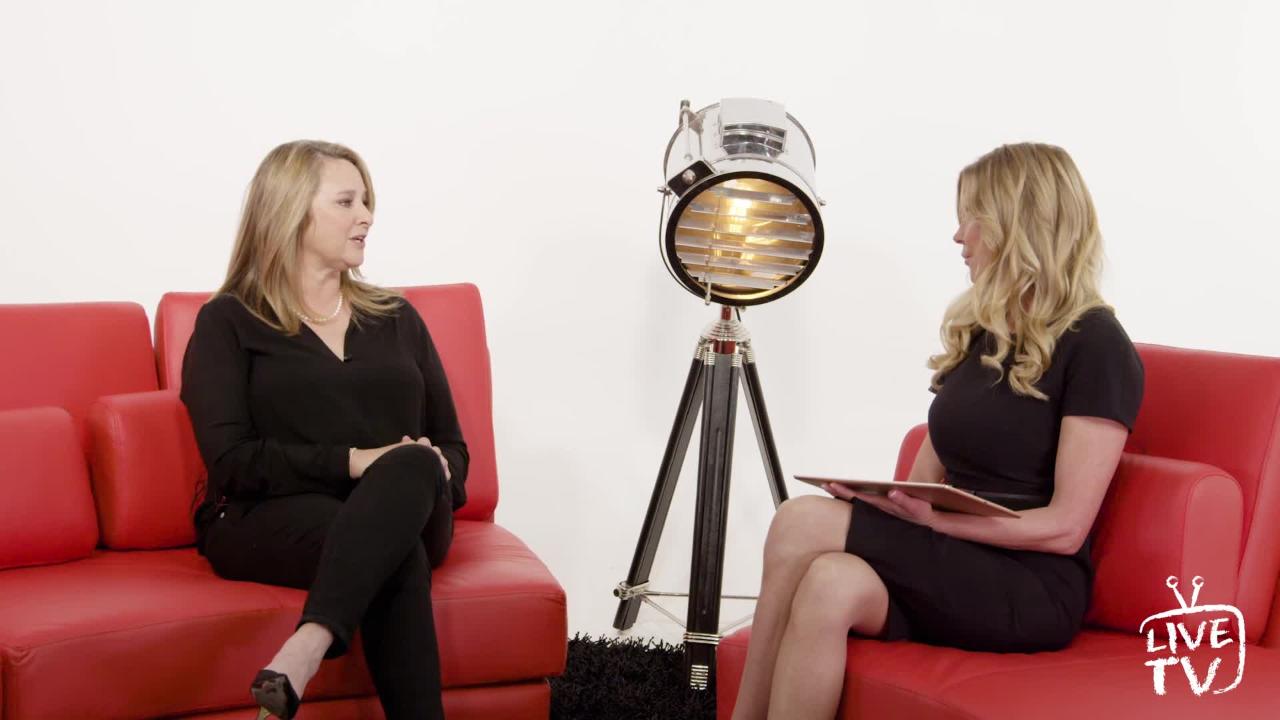common is it that people have surgery?
Dr. Sheryl Ross: It's not that common, Leana.
Leana Greene: It's not that common?
Dr. Sheryl Ross: I mean, really? No. If you've had four babies and there's a lot of looseness, and the vagina feels like you have a ball falling out of it, then that's one thing. But, for the most part, give it some time. The vagina's very resilient. It will heal on its own. Time and patience and some KY, they tend to work great.
Leana Greene: We have one more question for you, too. So here we go.
Speaker 4: During sex, how come we hurt so much, and how long will it take for it not to hurt anymore?
Leana Greene: Dr. Shery, what do you say?
Dr. Sheryl Ross: Yeah. Honestly, it takes about nine months after you've had a baby for the vagina to come back to its normal self. Sometimes, again, if you're breastfeeding, you're going to have really low estrogen. It makes the tissue dry and painful. Often, you need to just know that its going to need a little extra KY. Certain positions may be more painful, certainly the ones with deeper penetration. Just be aware, all those things are normal. Give your body about nine months to bounce back.
Leana Greene: We are going to go to the next parent.
Speaker 5: My husband and I had our first baby about six months ago. It's a hard thing to talk about, but we haven't had sex in a while. I'm just self-conscious about my body from being overweight and the stretch marks. I also feel awkward sharing my body with my husband because I'm breastfeeding. I'm just really trying to figure out how to get past that, where I could feel confident in myself again and where I don't feel awkward sharing my body with him, and where I can feel sexy again and where he looks at me the same. If you could just give me advice on what to do, how to get past that.
Dr. Sheryl Ross: It's so important to communicate with your partner. Be honest, and just know that the two of you are building this beautiful family together. Do it together. Look beyond more of the superficial issues related to how you appear, but just go back to the beginning of basics and why you're together and this great little being you've just created. I think time and patience and being open communication-wise is so important.
Emma Johnson: Your husband wasn't checking you out because of your thin figure or because of a dress that you fit into. He was picking up on your own sense of your own sexuality and beauty. Finding ways to actually do that ... Yeah, standing in front of the mirror ... I mean, it sounds cheesy, but those positive affirmations, they do work. I want you to take it a bunch of steps further. I want you to masturbate. Have orgasms whether they're with him or alone. Wear pretty panties ... whatever that means for you, whatever is going to make you feel sexy ... even if you're the only one seeing them for a while. I want you to do those, because that's what he's going to respond to. It's not the size of your jeans.
Stephan L.: The first thing is to make sure that you talk to your husband and you express how you feel to him so that he understands that you withdrawing from sex is because of the conflicting feelings you're having within, and so he can now work with you on building that confidence back up, and as was mentioned earlier, celebrating your body. And not just relying on your husband to celebrate it, but for you to celebrate it, for you to look in the mirror and remind yourself that you're beautiful, that you're desirable, that your husband does want you. You have to now kind of work your way back into being more intimate with your husband. That might be having some small steps as far as, you know, cuddling, kissing, the small things to kind of ease into it and build that confidence back up, but make sure you keep the communication open with your husband. Because if he doesn't know what's going on, it can create other conflicts in the relationship.
Speaker 8: Hi. Thank you for having me. Six months ago, my wife and I gave birth to our beautiful little boy Owen. It's been great. But the sexual part of our relationship was struggling before the baby, and now, six months after, it's still been struggling. She's having slight depression. It's just weighing on me. A couple days ago, I drunkenly went out, and I hooked up with a young lady. I told her. Now the question is ... I love my wife. I love my child. I don't want to lose either one of them ... what do I do to save this relationship?
Tammy Nelson: My guess is that you have some neglect and some trauma to your erotic life. That's totally different than your companionship, where you get to be like roommates and take care of your kids and pay the mortgage and decide what movie you're watching on Netflix. I can give you some tips. One, you have to have a sex date once a week even if you don't have intercourse, because we need to remember that sacred contract that you have between you to create a sacred space, and a commitment to each other separate from your parenting life. If you don't have that time set aside, there's no place or space to talk about what's happening. You guys have a lot to talk about.
Speaker 10: Dr. Gray, my question for you is, how do you get your wife's sex drive back, and how can you keep it running in the long term?
Dr. John Grey: In order to bring back the passion and relationship, there is no quick fix. It takes a lot of romance. It takes good communication. It takes working a bit on your relationship. We expect things to happen automatic today. We have immediate gratification. But actually, our life has sped up so much, and we have to slow it down. We have to spend more time together. For a woman to be attracted to a man and turned on, her estrogen levels need to double. Whenever you feel love and loved ... someone's doing things for you, someone's listening to you, someone's attending to you ... your estrogen levels go up. We have to go back to old-fashioned dating skills, where you actually have to take time to stimulate the right hormones to create the magic of attraction. But it takes work and new understanding.
Speaker 12: My husband and I, when we first met, we had an amazing sex life. We've done the craziest things, and it was awesome. But since we had the kids, I just don't feel as comfortable anymore doing those things. Now my question is, how do I make him be okay with just doing the regular stuff?
Dr. Jenn Mann: Why is it that I'm uncomfortable with this now? Is it that that just happens to be something that used to turn me on that no longer does, and that's just kind of part of my sexual evolution, or do I have judgment about what I used to do? Do I have an idea about what kind of sex moms should have versus pre-baby? Because what I would hate to see is for her, not just her husband, but for her to lose the ability to do something and do these activities that were a lot of fun ... It sounds like they were enjoying a lot of kinky, cool stuff ... because she now has ideas about the shoulds. I hate the shoulds. When it comes to sex, I'm very anti-should. We really need to look at what turns us on. As long as it's consensual, both people are on board, and both people are comfortable, I'm all for it.
Speaker 14: My husband and I, we have three children. After the third child, he's ... Well, he travels a lot for work. We haven't been having sex that much. Is it normal for him not to want to have sex? Does that mean that he could be having an affair?
Dr. Jenn Mann: Have a conversation with him. Find out what's going on that he's less interested in sex. Secondly, let's rule out the physical. Have him get his testosterone checked to see if that's an issue. Then I would want to really talk to him about, what can we do to make sure that we create and environment in our home and in our life and in our marriage that is conducive to us having sex?
Leana Greene: I am going to start by asking you, what do you think are the best tips to keep a good sex life after you have kids?
Dr. Jennifer B: I think that's a good question, not just after you have kids, maintaining intimacy through all-
Leana Greene: I guess, even if you're not [crosstalk 00:10:06].
Dr. Jennifer B: ... phases of life.
Leana Greene: Yeah.
Dr. Jennifer B: But in particular after kids, because what happens is, you go from being this insular sort of unit ... male/female or whatever it is ... to kind of a triangle between the baby at the center and the two of you behind. The whole dynamic of the relationship shifts. Nobody prepares you for that. I mean, you know that it's going to happen, but you don't know. At least I didn't know, and from all the women that I've spoken to and men.
Leana Greene: And especially so are the first three years, I think.
Dr. Jennifer B: The first three years are the hardest because the children are the most dependent. They can't function on their own. They can't feed themselves. They can't entertain themselves many times. It's very hands on, constant need machines, that can be draining. Not only do you have to make time for somebody else, your partner, but you're drained and tired and exhausted. No matter what, even in those conditions of fatigue and where you can't even fathom having sex, do.
Leana Greene: Well, thank you so much for being with me.
Dr. Jennifer B: Thank you for having me. Any time. I hope to come back.
Leana Greene: Absolutely.
Dr. Jennifer B: Thank you.
Leana Greene: Over and out from Kids in the House.

























